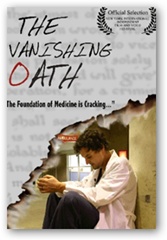This is a nice write up from Dana over at ZDNet and I think right along the same lines for the most part here too. I have been watching this evolve and I interact with people from both side of the fence, or maybe should I say all sides of the fence. As a patient you may not be aware of what goes on behind the scenes with physicians, I am after spending quite a bit of time in practices, listening, helping and trying to bring things current. As a patient, don’t lose your patience here and expect your physician to be on top of the latest devices and record keeping systems today, it will get there, but work as a partner and not one exercising criticism in this area. 
It’s good by all means to be an informed patient and I promote it, but keep in mind the balance with your physician too and focus with them as a partner, don’t judge in this area too quickly. We are all being thrown a new left curve every day with Health IT. Not too long ago I sat down with a small group of doctors who wanted to learn some basics of social networking and some of the “free” things they could do to get up to par, and these are all doctors with paper records.
They all had the right attitudes and were willing to learn but everyone was at different levels and the exact words spoken to me was “we need someone to help us through and hold our hands”, and that does not take any credibility away from the group at all, it’s a reality. We have leaders that don’t even know what the heck a PHR is (as seen in the Senate testimonies with healthcare stimulus money in January 2009) that sit there in Congress so use that as a comparison when you want look for the lack of role models and how up to date our lawmakers are too. One individual has a direct impact on your health, the doctor, and the other folks, well they can’t figure out what and where to impact with lack of some additional tech knowledge and that’s why they can’t see what is happening with the physicians.
HHS National Plan to Improve Health Literacy – Not Going To Happen Until We Focus on Using Technology (The Tool for Literacy) Which Includes Role Models at HHS And Other Places in Government
If you want more healthcare literacy, start with your own and the link above talks about where everyone falls short with the ideals of “its for those guys over there” and stop jus throwing money around without any real personal involvement.
They don’t get it and keep piling more on, so it’s time for the leaders in Congress, at HHs and other government agencies to spend some face to face time with the real world outside of a PC and get a clue so they can get their groove back. As Dana mentions here, the movie “The Vanishing Oath” which he links back to my blog post is what one needs to look at to see the future of young doctors today if we keep going down this same path.
If you happened to catch the lecture at Berkeley by Bill Gates earlier this year, he focuses on telling students you need to be a “hybrid” of some sort, in other  words have input in more than one area. We have very little of that, at least from what I am seeing. You can watch his speech at the link below.
words have input in more than one area. We have very little of that, at least from what I am seeing. You can watch his speech at the link below.
Bill Gates speaks at UC Berkeley Global Health, Education and Thoughts on Philanthropy
One outstanding individual that comes to mind in Health IT is Dr. John Halamka at Beth Israel Deaconess/Harvard Medical in Boston, why, he’s the forensic hybrid!
I meant that as a compliment and he gets out there “hands on” and he’s a physician as well as being in Computer Science, a fabulous combination that is pretty rare but one we should listen to as there’s a lot of knowledge and sharing there. He has been chipped, sequenced and a few other things and lives to share and talk about it, which is great because we get to learn that way from someone who has done it, touched it, and can relate from being a “hybrid”, seeing more than one point of view and being fair and honest.
There are not too many people around first of all with that level of knowledge and secondly and even more important the ability to be communicator and share with more than one focus, so we get around special interests and can see the big picture a lot better. I do a lot of reading and research and so much of what I hear and see is just repetition without anything new added and thus I came up with my own term called “Magpie Healthcare” and that’s about where we are today.
I am hybrid too of sorts, sales/marketing/coding and it all plays out with what I post here and my passion for trying to help other and find a better way and I connect the dots in ways you may not find on other blogs, and yes it may make people uncomfortable to read some of this but it’s all documented and truthful, and the minute I stop making people uncomfortable, it’s time to stop blogging as that would mean the brain has stopped (grin) and one day that will happen to me as it will for all of us, but hopefully not for a long while.
Let doctors practice medicine as our partners in healing when we need them and let’s see if we can stop some of the madness with having them backed into a corner to justify their existence. Health IT will evolve as we all move along and participation is needed by all and collaboration works so much better than finding fault and judging every move they make. BD 
This week’s Health 2.0 event in Washington accidentally served as the last chance for hospitals to seek a delay in the meaningful use guidelines expected to be finalized late this month.
With even the industry’s leading IT users — Intermountain, Kaiser, and Mayo — insisting they can’t meet the requirements for that sweet, sweet stimulus cash, expect some significant watering down.
This could happen in three ways:
- Slip the dates – Turn 2011 into 2012 and now everyone has an extra year to comply with what appear, on the surface, to be reasonable requirements.
- Cut the requirements — Right now there are dozens of specific requirements to be met in 2011, 2013 and 2015 to get the cash. Modify those goals and more can qualify.
- Allow partial credit — I first saw this offered by Dr. David Kibbe. Rather than require everything be done and working, give practices some money for getting some things going.
In this case we’re not just looking at programmers to do that work. We’re looking to dopey doctors, people who are already up to their eyeballs in paper and patients and billing. Expecting change on top of this may be too much.
The documentary The Vanishing Oath describes a world where insurance, malpractice, and government bureaucracy are all combining to drive doctors to hate their practices. They should, because they’re spending less-and-less of their time practicing medicine, and more-and-more time trying to justify what they’re doing.
Expect slippage on meaningful use guidelines and dates | ZDNet



0 comments :
Post a Comment